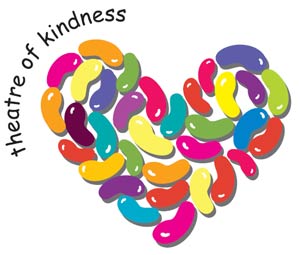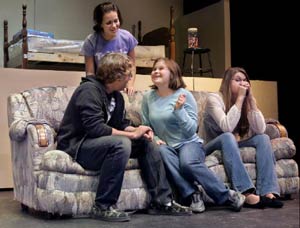Theatre of Kindness: The Jellybean Conspiracy Show
March 30, 2011

|
The letter said, quite simply: "Thank you for giving a very special someone her chance to stand up and be counted. You made it possible for her to do something wonderful that touched the hearts of many."
The writer was a dad from Salina, Kansas. The "special someone" he referred to was his daughter, Gabby, who had just completed her run as an actor in The Jellybean Conspiracy Show at Salina South High School. The Jellybean Conspiracy is a variety show currently playing in schools nation-wide play that includes the story of a young woman with intellectual disabilities who brings a remarkable gift into the lives of those around her. What makes the show unusual is not the story-similar stories have been told in plays like The Miracle Worker, or The Boys Next Door--but the casting. While most of the performers in the show at Salina were from the school's drama department, Gabby was from special education.
It was a long and difficult road to Gabby's appearance on the stage in this production. In the early months of her life, she had suffered a series of major medical set-backs, that had left her blind and deaf and partially paralyzed. Although her vision and hearing recovered somewhat, the brain damage associated with the stroke remained. For years, she lived in the world of acute autism, moving her arms in apparently random fashion and repeating jingles from television commercials.
It seemed unlikely that Gabby would ever read a book, let alone sing in a choir or act in a play. Under the guidance of caring parents and teachers, however, she eventually accomplished all these and more. She became an avid reader, took part in her school's vocal music program and, most recently, played the role of Tam in The Jellybean Conspiracy Show. Throughout the run of the show, she revealed an unusual gift for the stage and became a vital part of the acting company.
Gabby Boss is one of many young people with disabilities who've found a place to share their gifts as part of the Jellybean Conspiracy. The Show has offered rare opportunities for young people from special education programs to be welcomed as members of one of the nation's most creative community-building agencies -the high school theatre company. Students with various disabilities, including Down Syndrome, autistic spectrum disorders, Fragile X Syndrome, Rhett Syndrome, cerebral palsy and other developmental disabilities, have had a chance to shine both on and off-stage and, in doing so, have helped create a new and hopeful kind of theatre. They are part of a growing movement that includes Special Olympics and Very Special Arts to realize the dream of a jellybean world.
Most educators accept the idea that the thoughtful inclusion of students with disabilities in the community of learning is a good thing for the young people involved. While there is general agreement on the desired social and educational outcomes, there are differences in the strategies used to reach them. The Jellybean strategy is to give students with disabilities an opportunity to work alongside their peers to create a theatre production everyone can be proud of. They are given roles and responsibilities according to their personal interests and abilities. Some love to act or dance or sing or play a musical instrument. Others prefer to appear on stage in crowd scenes or ensembles. Others choose to work back-stage, helping build a part of the set or creating the art-work for posters, while others like to help in the front of the house, taking tickets, giving out playbills, or working concessions. If it's something they love and want to do, there are places in the Jellybean Show for them.
The participation of special education students in a middle or high school theatre show brings a new level of vitality and purpose to the stage. Their very presence brings deeper meaning to the words "ensemble" and" company". After participating in the Jellybean Show at Belton High School just south of Kansas City, Missouri, a student wrote:
"The Jellybean has greatly affected my life and other cast members. I was amazed by how much I was able to reach out to the students from special education and find so much in common. A lot of things in life are like that--if we just try, we can get along with anyone. I'm so glad I've made the relationships I have through this play. If it weren't for the Jellybean Conspiracy I know that I would still walk through the halls of my high school without being aware of the qualities of other people. Now, instead of ignoring them, I embrace those who are different."
 |
The script calls for lead role to be played by a young person with Down Syndrome or similar disability. Almost every special education program in the country has one or more students capable of performing the part. If these young people are presented with the opportunity so that they understand what is required of them, they embrace it with heart-felt joy. Many of them are already creating characters at home and miming their favorite performers. They're just waiting to be asked. In some communities, where the right actor can't be found in special education classes, there is a young adult at the local sheltered workshop who'd love to be included in the cast of a theatre show.
At Wellington High School in rural Kansas, the role of Tom was played by Jeff Pooler, a young adult who had graduated from the special education program some years before. Jeff had always loved theatre; it was his dream to be an actor. Jellybean gave him his chance. His generous heart and outgoing personality endeared him to everyone in the company, including the director, Dan Heath. The sold-out audiences loved him. After the Show was over, he wrote: "Thank you for choosing me for the role of Tom in the Jellybean Show. Acting is something I always wanted to do, but never had the chance before."
It is quite rare for a high school show to offer a central role to a student from special education. The Jellybean Conspiracy Show is therefore a new experience for everyone. The performers from special education try things they have not tried before and bring a spirit of joy and purpose to the whole production. Theatre students expand their improvisational skills to help integrate special education students into class-room scenes or dances. Directors find innovative ways to support the work of Tam or Tom both on- and off-stage. The whole company becomes an experimental community of people working together to create a production they can all be proud of.
The first Jellybean Show was presented in the Spring of 2001 at Richmond High School in Missouri under the direction of theatre teacher, Jill Jones. The lead role was played by 15 year old Brian Harrison, a special education student who had never been in a school theatre production before. With his infectious smile and genuine desire to share stage with his theatre friends, Brian brought a rare sense of joy and purpose to the whole production. "It was one of the been one of the most touching events of my life," wrote one student. "It has truly been a privilege to be involved." There are similar stories from many other schools.
Since 2001, the Show has been successfully presented in 70 schools nationwide, with over 2,800 student participants, including 600 from special education. It has played to total audiences of over 100,000. There is a scene in the Show where Tam starts moving to the beat of one of her favorite country songs. As she dances, she enters a fantasy world where she herself is a country music star singing and playing her guitar. The country star of her imagination joins her on stage and the two begin to sing together. In those few seconds, we catch a glimpse of how Tam sees herself -strong, energetic, accomplished, and above all, happy. It is a vision of life that many have shared as a result of being in the Jellybean Show.
The story of Gabby Boss and the Jellybean Conspiracy is still being told. Under the direction of Kate Lindsay, the theatre department at Salina South High School created a new award--The "Jellybean Award"--to recognize outstanding performance and exceptional achievement in theatre. The first recipient of this award at the school's annual STAR Night in was Gabby Boss. She'll be remembered at Salina South--deservedly so--for a long, long time.
Howard Martin
Howard Martin is a faculty member in the Department of Theatre at the University of Missouri--Kansas City and Executive Director of the Jellybean Conspiracy.
www.jellybeanconspiracy.org. The Jellybean project was created in partnership with the UMKC Institute for Human Development in Kansas City, Missouri. Inquiries about The Jellybean Show can be directed to him at [email protected].







